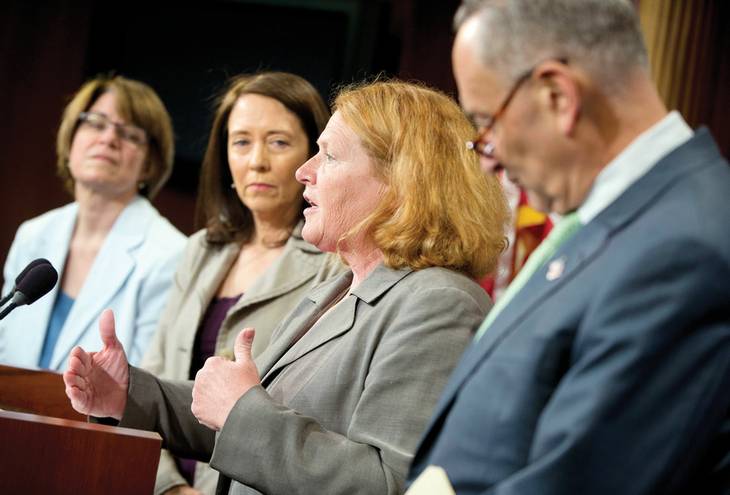Carlos Banchik was practically raised on construction sites. As a boy in Argentina, he helped his father, an engineering contractor, build low-income housing. Following in his dad’s footsteps was only natural. In 2003, Banchik started a small engineering business, Innova Technologies, in Las Vegas.
While hundreds of companies nationwide tanked during the recession, the business thrived, first by engineering multiple projects at CityCenter, then by finding a niche few companies offered in the international export-import market: monorails.
But after more than a decade in business, Innova Technologies, which employs about 20 people, may encounter one of its first major hurdles.
On July 1, Congress went into recess without voting to reauthorize the Export-Import Bank, an 81-year-old federal credit agency that provides financial support to help U.S. companies sell goods overseas and allows businesses such as Innova Technologies to export goods even when private insurers are hesitant to partake in risky investments.
The bank’s closure means it cannot enter into any new transactions. In other words, were Innova Technologies to build another monorail outside the United States, it would have to turn to the private sector to buy a credit insurance policy.
At the core of the debate is whether the bank serves big business or small businesses and whether government should be involved in business at all.
Members of the Tea Party and libertarian groups argue the bank is a paradigm of corporate welfare. Last year, the bank, known informally as hte Ex-Im Bank, authorized $20.5 billion of financing for U.S. exports, which supported more than 164,000 jobs, according to its annual report. But critics say 87 percent of the bank’s loan guarantees go to just three companies, according to U.S. News & World Report: Boeing, Caterpillar and General Electric.
Rep. Jeb Hensarling, R-Texas, House Financial Services Committee chairman and the bank’s most vocal opponent, maintains the agency interferes with the free market.
“The bank is a small-scale example of a larger and more dangerous threat: the shrinking of the free-market economy and the rise of a progressive welfare state,” Hensarling wrote in an op-ed column for The Wall Street Journal.
The bank also faces corruption charges. A House of Representatives hearing in April revealed there were 31 open fraud hearings pending against the bank.
At the hearing, Hensarling reprimanded Ex-Im Bank Chairman Fred Hochberg about the bank’s activities, which the congressman said resulted in a quarter of a billion dollars in fines, restitution and forfeiture.
Advocates of the bank, however, say it supports two important components of America’s business foundation: small companies and competition.
Supporters say that without the bank, small businesses likely would be unable to sell goods abroad. Those businesses include Innova Technologies, which has built monorails in Brazil, Saudi Arabia, India and Peru.
When the bank approves financing for big businesses, it’s helping small businesses too, spokesman Lawton King said.
“These large companies have thousands of small businesses in their chain,” King said. “Those small businesses make money when a large corporation has an order.”
Most importantly, supporters say the bank keeps the United States competitive in the global market, especially when other countries, including China and France, have similar agencies. Without the Ex-Im Bank, advocates say, companies such as Boeing likely would lose business to competitors such as France’s Airbus.
In Nevada, the Ex-Im Bank has supported about $165 million in export value since 2007, according to the bank. Last year, about 36 percent of small-business exports in Nevada were backed by the bank, according to its annual report. That amounted to about $11.3 million in exports.
U.S. Rep. Dina Titus, who visited Innova Technologies before the bank’s expiration and pushed for its reauthorization several times on the House floor, says the bank benefits businesses big and small.
“This, to me, isn’t government assistance,” said Titus, D-Nev. “(Some Republicans) just want a total free market.”
She also said the bank helps create jobs in Nevada, a key consideration given the state was one of the hardest hit during the economic downturn.
The bank’s biggest customers, including General Electric, have threatened to move jobs and factories overseas if the bank is not reauthorized, but small businesses such as Innova Technologies don’t have that luxury.
Innova Technologies has used the bank since 2005 after a project in Saudi Arabia went sour and Banchik and his staff were not paid in full. Now, in exchange for a premium, the bank would pay the company almost the full cost of a project were a client to delay payment. The bank then would pursue the client to collect the amount owed.
Without the bank, Innova Technologies is at risk of delayed payments and might have to leave the export business altogether.
“In these large projects, you’re a small company dealing with very large entities,” Banchik said. “For small companies, the Ex-Im Bank is our livelihood.”
Exporter Panch Prasad also said the bank is the lifeblood of his business, U.S. International Trading Corp., an exporter of organic health and beauty products.
Through loan guarantees from the bank, U.S. International Trading Corp. is able to pay product manufacturers. Without the bank, Prasad said, the future would be uncertain.
“It will be difficult to pay employees,” Prasad said.
He said he believes the bank had prioritized big corporations over small businesses.
“If I were the administrator of the Ex-Im Bank and I had a choice, my first preference would be to small businesses first, then large businesses,” Prasad said. “I don’t know the details of the big businesses, but they can survive. There are many other sources for them.”
Despite the shutdown, the bank has bipartisan support. King said members from both sides of the political spectrum said they would try to put the bank’s reauthorization to a vote after Congress reconvenes.
Banchik said he thinks politicians were choosing sides simply for the sake of talking points.
“It’s like being stabbed in the back by people who should be defending you,” he said.
The political banter has made Banchik reminisce about the origins of his engineering career. He credits his father and their time together on construction sites.
“That’s one of my favorite memories — traveling with him,” Banchik said.
But Banchik said the political debate made him feel as though his story may not matter.
“It’s very easy to sit in D.C. and fly first class and make decisions,” Banchik said. “But their vision of the world is not what I experience.”

